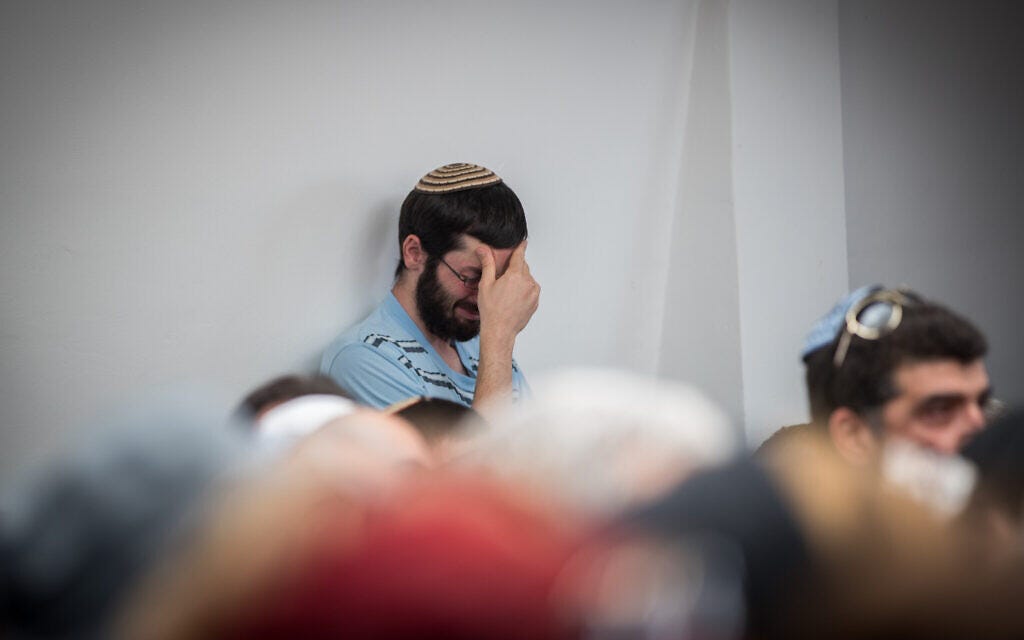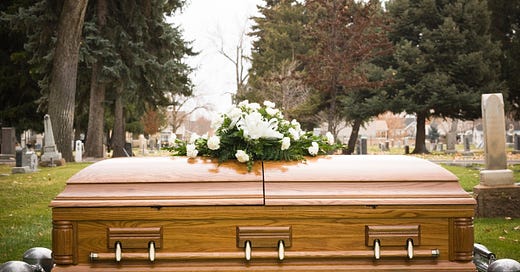What we get so wrong in our death customs and how it could be different.
Hi could you create an event for everyone you know that adequately pays homage to your deceased loved one's existence on the worst week of your life please and thank you!
When something doesn't make sense to me, in an attempt to gain some clarity I like to pretend I'm having a conversation about it with a little blue alien named Blubo who knows nothing about our human ways.
This week Blubo and I had a conversation about funerals and death customs in our culture.
Here's an excerpt:
Blubo: So when a human dies, their body is returned to the earth to decompose? The same as the rest of the mammals?
Me: Well…. there are a few barriers. We bury our dead in boxes.
Blubo: Boxes that easily decompose?
Me: Not at all. Inside and out the often metal box is not meant for decomposing. And to ensure the impossibility of benefitting the earth, we wrap the boxes in cement, metal or plastic vaults.
Blubo: If the box is so important, does the person get to pick out which box they would like before they die?
Me: No. Their loved ones do.
Blubo: Well, hopefully picking out the box is their loved ones only responsibility? Surely when someone dies those who are closest to the person have the fewest responsibilities?
Me: No. When someone dies, the week they die those closest to them must purchase a burial plot, arrange all the many details of burial, write a summation of their loved ones’ life called an obituary, plan an event including speeches, luncheon, photos, musical numbers and decor for everyone their loved one knew to come grieve, meet and console everyone who knew the deceased in a line next to their dead body.
Blubo: Wow….. that’s.. a lot. Are they at least showered with gifts and compensation?
Me: Unfortunately instead of receiving money, they must spend quite a bit. On average its $2000 - 10000 for casket, $400 - $8000 for a burial plot, $1000 - $3000 to open and close a grave, $3000 for funeral costs, $1000-$5000 for a headstone, and $700 - $1000 for embalming and cosmetics.
Blubo- I don’t understand. It’s free when squirrels and bears die. Their bodies return carbon and nitrogen to the earth creating life from death. Why must you pay money to die? That doesn’t make any sense. Why can’t you bury the body on the land?
Me: There are laws against that.
Blubo: Why not burn them?
Me: There are laws against that. You can choose cremation, but that must be done by a crematorium which will charge you thousands of dollars to burn a body.
Blubo: Your laws charge you money for having a loved one die?
Me: Yes.
Blubo: Why would you make the person closest to the deceased pay so much and do so much labor in their first week of grief? Isn't that cruel?
Me: Yes. Yes it is.
I flew out to the funeral of a family member this weekend. And I’ve seen those with the most to grieve shoulder such an unfair amount of labor and cost in this week of tragedy. I just.... can't get over how cruel our current death culture is to the grieving family.
So much of it should be exactly the opposite of how it is.
Those closest to the person should have the LEAST to do in the wake of their loved one's passing, not the most.
We make those in the most pain do all the work for the benefit of acquaintances. It should be the exact opposite- those less close should do all the work to benefit those closest.
I’m flying out to the funeral in order to support my loved ones, but I’ve been asking myself- is my presence at an event that they must plan and pay for really offering all that much support? Would it not have been more helpful if I had taken the money spent for a flight, rental car, and food and gifted it to the family instead? If I really wanted to be of service wouldn’t it be better if I flied out not during a stressful funeral where I will get to hug my loved ones for a few minutes, but instead gone mid-week to cook and clean for them? (Obviously this is something I could have done/ want to still do, but it would be nice if it were part of the culture instead of counter-cultural).
Burial should help the earth, not harm it. Dying should be free not $20,000.
Just how bad is the death of the average American for the environment?
Here’s a quote from National Geographic:
“American funerals are responsible each year for the felling of 30 million board feet of casket wood (some of which comes from tropical hardwoods), 90,000 tons of steel, 1.6 million tons of concrete for burial vaults, and 800,000 gallons of embalming fluid. Even cremation is an environmental horror story, with the incineration process emitting many a noxious substance, including dioxin, hydrochloric acid, sulfur dioxide, and climate-changing carbon dioxide.”1
The more I think about this the more I just want to pull my hair out- so much unnecessary cost to the family AND to the earth and FOR WHAT?!
Maybe it would be understandable if there were no good alternatives, but given how perfectly obvious and easy the solution of natural burials is…. it’s just maddening.
Dead humans have been buried for free for hundreds of thousands of years upon death just like the rest of nature, so the fact that this option is no longer available to us by law is… insane.
It could be different: 3 cultures that give me death culture envy
Traditional Jewish death customs
During my spiritual direction training program, we had a few classes on death customs of various religions.
I’ll always remember the class taught to us by a rabbi about death customs in traditional Jewish culture because I kept thinking, “Oh my gosh, this makes so much more sense than how we do it!”
Here are a few of the notes I took during that class on Jewish death culture:
They bury their dead within 24 hours of death.
The rabbi arranges everything so as little as possible is required of the grieving family.
The dead are buried in a simple pine box, so complicated pricey coffin decisions are by-passed.
There is no public viewing of the body, so no embalming, hair care or cosmetics.
Mourners aren’t expected to say anything. Instead, they rip up cloth or fabric.
The seven days after the funeral is known as “shiva” for the deceased’s family. During Shiva, nothing is expected of the grieving family. Family members and close friends come, bring food, cook and clean for them. They also share memories of the deceased together.
Often the mirrors in the house will be covered and personal grooming is by-passed.
The second mourning period is called “shloshin” and can last anywhere from a month to a year.
I don’t have any desire to become Jewish, but for my family’s sake this week I kind of wish we were.
I feel like the traditional Jewish way takes the best part about funeral gatherings: the communal support, the reminiscing of fond memories, the sharing of photos and videos; and leaves the worst the worst: all the stress, money and effort to plan a funeral and burial.
I want the requirements for the grieving family to be absolutely nothing except falling apart.

Dutch Funerals (both today and in 1902)
While digging about the internet on different death cultures I discovered that despite the fact that embalming was invented in the Netherlands, embalming is no longer permitted there because of how terrible it is for both those who administer it (formaldehyde is a known cancer-causer) and for the earth.
Which caused me to look up more about dutch death culture, which caused me to learn interesting tidbits like
Most people are cremated in the Netherlands.2 And for those who aren’t you can rent instead of buying a grave, which saves families a lot of money as well as saving land. In 10, 20 or 30 years, the deceased’s remains will be cleared out and opened up for someone else.
For the people who die alone with no friends or family, a group called Poule des doods (literally pool of poets) will research the deceased and write a tailored poem for those who have no mourners at their funeral. They might be homeless, undocumented immigrants, victims of crimes, addicts. Some of these poets have attended hundreds of ceremonies with no one else in attendance.
In my research of Dutch funerals, I came across a description written of funeral customs from 1902, where I learned that at that time it was someone’s specific career to be a death announcement deliverer. When a loved one died, you would hire this person to go around the city and deliver the news of the death so you wouldn’t have to.
I’m happy for the Dutch mourners in 1902 who had that service available to them, and sort of wish we had a death announcement delivery service so the grieving family wouldn’t have to text/call/email everyone they’ve ever met to personally deliver the worst possible news.
Beyond death announcement delivery, the Dutch in 1902 also did community support really well. Here’s a quote from that piece:
“When one of a family dies, the nearest relatives immediately call in the neighbouring women, and these take upon themselves all the necessary arrangements. They send round messages announcing the death and day of interment; they buy coffee, sugar-candy, and a bottle of gin, wherewith to refresh themselves while making the shroud and dressing the dead body; and the next morning they take care that the church bells are duly rung, and, in the afternoon, when the relations and friends come to offer their condolences, they serve them, as they sit round the bier, with black bread and coffee. When the plates and cups are empty the visitors leave again without having spoken a word.” - P.M. Hough. Dutch Life in Town and Country
Ok. Let the record show that I decidedly do not like the blatant sexism of dumping all the unpaid labor on the women. But, I do like that again, the mourning family is protected while the community shoulders the work for communal grieving- including dressing the dead, providing the food, arranging the funeral. I also like that no one is expected to speak.
(and that they didn’t charge $10,000 to mourn your loved one)
Chinese Funerals
Obviously China is a massive country with a variety of different regions, religions and cultures, so death customs will look very different depending on where in China you are.
But my friend’s neighbor moved to the States from China years ago. Recently both her parents died in the same year, but in her culture an entire year is reserved to grieve the death of a family member, so they hold only one funeral per family per year.
The funeral for her dad will be held next year.
Since funerals are so taxing to plan, I love the freedom afforded them of being able to hold funerals far after the death of a loved one so it’s not all happening at the peak time of grief and adjustment.
Also it is traditional for every funeral guest to gift the grieving family a white envelope with money in order to cover all funeral costs and as a token of generosity.
Why don’t we do that?
Sky burials of Tibet
Tibetan Buddhists believe that death represents the end of one life (the life of the body) and the soul’s journey into the next. Since the body is seen as useless one the person’s spirit departs it, they use the body as a gift to the world by nourishing other animals.
The vulture is a sacred animal to the Tibetans, so gifting the deceased’s body to the vultures is seen as a last act of charity and generosity.
Mourners ascend up a hill or mountain where the body is prepared to be left outside for vultures or other birds or animals to devour.
Australian Aboriginals
Two main reasons I’m including the indigenous peoples of Australia here: 1. natural burial and communal grieving and 2. they call life after death “everywhen” and I’m now obsessed with that word.
Like most indigenous people (and most of human history), they hold natural burials where they bury the bodies of their dead in the ground without cement or metal boxes. They hold a smoking ceremony as they grieve and celebrate the life of the deceased together.
According to the beliefs of Australian Aboriginals, the human spirit cannot be destroyed even once the body dies. Instead upon death one’s spirit joins the “Everywhen” - a term without a successful translation (the closest translators have come up with is “the dreaming”). The Everywhen exists beyond space and time, the immortal spirit both came from the Everywhen before birth and returns to it upon death.3
Ok, talk to me about your thoughts on death customs in our culture- what do you like? What do you wish was different? What’s been your experience with it?
Another interesting Dutch death fact: Crematoriums collect on average 50g-150g of gold and precious metal per body. The money raised from selling gold, jewelry and precious metals is all donated to charity.






I don't remember where I heard about this, but I read once that there's a thing they can do with your body when you die where you can basically become a tree. I love that idea so much. Can you imagine going to a beautiful forest and every tree is a person? ❤️❤️❤️
My parents for the last 10 ish years have been in the period of their lives where their parents are dying. They are both oldest children and have had to do a lot of work to plan funerals. Because of how stressful and difficult it was, they already have their own funerals planned and paid for. Which I appreciate. But I really love the idea of more community support around death. Especially extending beyond the funeral.
Glennon Doyle had a ‘death doula’ on her podcast awhile ago and I’m fascinated with them now. They help people plan their death/funeral/arrangements in order to make the process better for both them and their loved ones once it happens. Obviously it doesn’t help the already high costs of the customs of dying, but it helps with the emotional labor and provides support to both the person dying and their family.